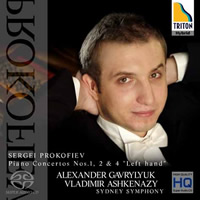| Review by Arthur November 4, 2010 (12 of 16 found this review helpful)
|
Performance:  |
Comparison: Prokofiev: Piano Concertos Nos. 2 & 3 - Kempf, Litton
Let me say first off that I have trouble with reviews. It's not that I don't have opinions about the recordings I listen to, but to do a proper review I must listen and re-listen, and then if there are comparisons, I must listen and re-listen to those as well, often switching back and forth. A whole disc can easily take a week of concentrated listening, and frankly I don't have time to do the job justice. Moreover, sometimes there's only one of the works that really interests me. So I've decided to simply review the Second Prokofiev Piano Concerto, which has recently been released on two separate labels.
I initially bought the Freddy Kempf disc because it had two items that are rather unusual for SACD, though I must say the Second Concerto had never really caught my interest before. From the first note this recording was quite arresting. I found over the course of a couple of weeks it was rarely out of my player. What peaked my interest? Well, first off, it has some of the "bad boy" Prokofiev of those early years - the massive chords of the first movement cadenza, etc., but more importantly it looks forward to the period a decade later when he was starting to explore the "worlds of the unseen", as I call it - the quiet mysterious music that is heard in the 3rd and 4th Symphonies among other works.
I loved the Kempf disc! So it was almost with disappointment that no sooner did I buy the Kempf disc than the Gavrylyuk cycle was announced. But being interested in the music of the early 20h century in general and Prokofiev in particular I knew I'd have to get both.
With the arrival of the Gavrylyuk I've been able to do some comparing. The first item to note is the greater impact and presence of the Gavrylyuk. But in going back to the Kempf, I realize that the piano balance is probably more realistic, at least in terms of what you'd hear from an excellent seat in a good hall. The Gavrylyuk sounds like it was recorded from the perspective of the conductor.
The second impression is that at low volume the Kempf loses its sense of presence. At first I thought this was because the Gavrylyuk was too loud, but in fact it is no louder, there is just a presence at low volume. When I turn up the volume to get a realistic sense of presence in the Kempf the climaxes become painful. Again, maybe this is about the recording having the perspective of a good seat, albeit a FLOOR seat! The sound from the orchestra - especially the players in the rear - goes right over your head - especially at low volume.
The Gavrylyuk is in stereo only. Despite this fact I felt more involved in the performance from a sonic perspective, despite the fact that the purist in me revolts at this thought!
What about the performances: in the first movement, Kempf grabs you immediately with a sense of mystery, but after about a minute the orchestra starts to ruin the impression. Detail after detail is lost either because the orchestra is playing softly trying to avoid drowning out the pianist or because they simply have a smoother, rounder, more cosmopolitan style of playing. I would have never imagined the Sydney Symphony to be a more "Russian" orchestra, but under Ashkenazy, their phrasing is consistently more earthy, more pungent, more involving. Still the Kempf is quite good in a very different sort of way - at least until the cadenza. In the first movement the cadenza is a very big deal lasting almost half the length of the entire movement. And in Kempf's hands, it's frankly a mess! When the pregnant second theme returns at about 6:30 over arpeggios it simply loses all momentum, when the chords break out at around 7:30 Kempf starts to lose all control of the line and by 8 minutes it sounds like some sort of atonal garble! Gavrylyuk turns this all into intelligible symphonic thinking by keeping an ear to the grand scheme. Kempf sounds to me like he has not truly lived with this cadenza; technique-wise he has to slow down just to play the notes. This doesn't have to be a disaster (just listen to Arrau play Liszt's Transcendental Etudes), but he doesn't sound like he has a plan to take us where he's going. After the orchestra re-enters, he regains his poise and the last 45 seconds or so of the movement is quite magical. Technically Gavrylyuk is simply in another league: he never has to make compromises for his technique, and it really shows in this cadenza, which comes off as completely logical in his hands!
The second movement is again a contrast of styles: Kempf shows us the Prokofiev who was the toast of the salons of Paris. But I truly believe Prokofiev himself was probably never as urbane as he was made out to be, and I suspect he would have felt more at home as the more rustic character given us by Gavrylyuk.
The third movement Intermezzo instantly has a huge contrast: marked "pesante", the Kempf is again altogether more urbane than the Gavrylyuk, which is almost menacing in its slow-footed inevitable tread. The woodwind entries around 3 minutes are marked by sparkling piano runs in the Gavrylyuk that are simply glossed over by Kempf. The climax in the Gavrylyuk is simply terrifying!
The finale begins in a rush, but after a couple of minutes it calms down and the piano is given a quiet theme that is reminiscent of what has gone before. In Kempf's hands this is quite magical. Throughout the Concerto, Kempf is at his best in the quiet and mysterious passages, but then listening to Gavrylyuk we hear a plaintive Russian-ness that is missing from the Kempf. Moreover, from the very first notes in the Gavrylyuk, the orchestra plays with greater virtuosity and character. By the time we're a minute in to the Gavrylyuk, we realize we're in the presence of something that is infinitely more complex and meaningful than what we hear from Kempf. In the solo passage around 3 minutes we immediately sense the kinship with Mussorgsky - something never even hinted at in the Kempf. Here, the sense of nostalgia is palpable.
At around six minutes, the proceedings come to a halt and the piano introduces us to a new lyrical theme. Again Kempf is bathed in mist, but the crystal clear Gavrylyuk captures even a greater sense of mystery! This passage is worked through in a way that makes the music become more and more remote, until finally the whole orchestra bursts in with the final reprise. In Kempf this is an assault; in Gavrylyuk, again it is organic.
As I'm sure you can tell, as a performance and as a recording I come down clearly on the side of the Gavrylyuk. And you might ask yourself why then was I so taken with the Kempf before hearing the Gavrylyuk. And my answer would be this: as a work I did not know well, the Kempf captured my imagination by presenting me with a mystery. But after playing it again and again, I realized he didn't have any answers to the mystery. When I put on the Gavrylyuk, I said to myself: "Aha! This is the answer I've been seeking!"
|
Was this review helpful to you?
yes |
no
|
|

